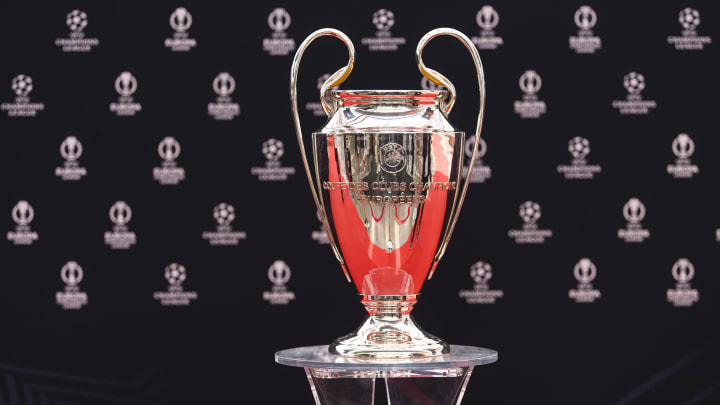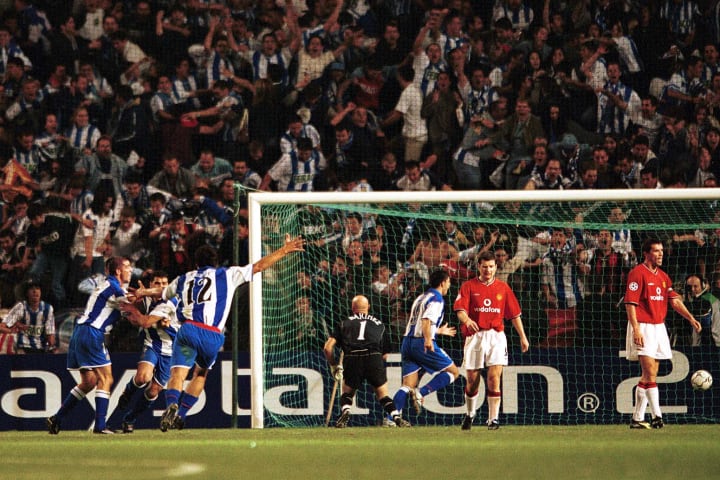The so-called Champions League 'group of death' is largely a modern phenomenon.
Under the previous guise of the European Cup, the continental jamboree was a knockout competition from the off. Diego Maradona's Napoli infamously earned a deathly first-round tie when they were drawn with Real Madrid for their competition debut in 1987.
The story goes that AC Milan owner Silvio Berlusconi was so appalled by the prospect of one great team getting knocked out by another so early that he set the wheels in motion for the modern Champions League.
Since the competition was reformatted in 1992, some of Europe's elite have been pitted against each other in a raft of menacing groups of death.
Milan, Leeds, Barcelona, Besiktas - 2000/01
Leeds United began their first season of Champions League in a decade with a humbling 4-0 loss against Barcelona. Yet, by the first Christmas of the new millennium it was the Yorkshire outfit that qualified above the Catalans.
Milan, perennial members of the continental elite, topped the group but Leeds made a mockery of the barb that they were the competition's "weakest link", as Deportivo La Coruna's manager had sneered.
Position | Team | Games | Wins | Draws | Losses | Goal difference | Points |
|---|---|---|---|---|---|---|---|
1 | Milan | 6 | 3 | 2 | 1 | 6 | 11 |
2 | Leeds | 6 | 2 | 3 | 1 | 3 | 9 |
3 | Barcelona | 6 | 2 | 2 | 2 | 4 | 8 |
4 | Besiktas | 6 | 1 | 1 | 4 | -13 | 4 |
Barcelona, Chelsea, Levski Sofia, Werder Bremen - 2006/07
Chelsea and Barcelona, reigning champions of England and Europe respectively at the time, topped Group A in 2006 but a golden Werder Bremen vintage was snapping at their heels.
With the Brazilian playmaker Diego supplying a 28-year-old Miroslav Klose in front of a backline that included Naldo and a young Per Mertesacker, Bremen only narrowly missed out on the Champions League knockout rounds but made it all the way to the UEFA Cup semi-finals that year.
Position | Team | Games | Wins | Draws | Losses | Goal difference | Points |
|---|---|---|---|---|---|---|---|
1 | Chelsea | 6 | 4 | 1 | 1 | 6 | 13 |
2 | Barcelona | 6 | 3 | 2 | 1 | 8 | 11 |
3 | Werder Bremen | 6 | 3 | 1 | 2 | 2 | 10 |
4 | Levski Sofia | 6 | 0 | 0 | 6 | -16 | 0 |
Arsenal, Juventus, Bayer Leverkusen, Deportivo La Coruna - 2001/02
Going into the final round of fixtures, back when the Champions League had not one but two group stages, all four of Arsenal, Juventus, Bayer Leverkusen and Deportivo La Coruna could have qualified for the quarter-finals.
Arsenal's narrow loss to Juventus in Turin wasn't enough to send the Italians through but the Gunners could have been saved by a Deportivo La Coruna win over Leverkusen. As it turned out, Leverkusen romped to a 3-1 victory in a season that would end with second-place finishes in the league, cup and Champions League.
Position | Team | Games | Wins | Draws | Losses | Goal difference | Points |
|---|---|---|---|---|---|---|---|
1 | Bayer Leverkusen | 6 | 3 | 1 | 2 | 0 | 10 |
2 | Deportivo La Coruna | 6 | 3 | 1 | 2 | 1 | 10 |
3 | Arsenal | 6 | 2 | 1 | 3 | 0 | 7 |
4 | Juventus | 6 | 2 | 1 | 3 | -1 | 7 |
Ajax, Liverpool, Napoli, Rangers - 2022/23
Rangers may have suffered the worst Champions League group stage campaign of the club's illustrious history in 2022, losing all six games while shipping 22 goals, but they were up against stiff opposition.
European footballing royalty Ajax were the least threatening of a group that also contained Jurgen Klopp's Liverpool and a Napoli side playing arguably the best football on the continent. No wonder the Gers struggled.
Position | Team | Games | Wins | Draws | Losses | Goal difference | Points |
|---|---|---|---|---|---|---|---|
1 | Napoli | 6 | 5 | 0 | 1 | 14 | 15 |
2 | Liverpool | 6 | 5 | 0 | 1 | 11 | 15 |
3 | Ajax | 6 | 2 | 0 | 4 | -5 | 6 |
4 | Rangers | 6 | 0 | 0 | 6 | -20 | 0 |
Bayern Munich, Deportivo La Coruna, Lens, Milan - 2002/03
When Bayern Munich come bottom of their Champions League group, it must have been a tricky posting. The European behemoths had won the competition just one year earlier but failed to get out of the group stage for the first - and so far only - time in the club's history in 2002.
Roy Makaay, who scored a hat-trick on matchday 1 against Die Roten, impressed for Deportivo La Coruna so much that Bayern bought him the following summer. The La Liga side finished above Ligue 1 runners-up Lens and level on points with Milan, who topped the group before winning the entire tournament that year.
Position | Team | Games | Wins | Draws | Losses | Goal difference | Points |
|---|---|---|---|---|---|---|---|
1 | Milan | 6 | 4 | 0 | 2 | 5 | 12 |
2 | Deportivo La Coruna | 6 | 4 | 0 | 2 | -1 | 12 |
3 | Lens | 6 | 2 | 2 | 2 | 0 | 8 |
4 | Bayern Munich | 6 | 0 | 2 | 4 | -4 | 2 |
Dynamo Kyiv, PSV, Newcastle, Barcelona - 1997/98
Out of a group that contained reigning Dutch champions PSV, Newcastle's Entertainers and a Barcelona side that would win consecutive La Liga titles, Dynamo Kyiv were the only club to advance to the knockout rounds.
A young Andriy Shevchenko gave the team a razor sharp edge but the legendary manager Valeriy Lobanovskyi, drawing upon the rigorous statistical analysis of his scientific partner Anatoly Zelentsov, made Dynamo a European force.
Position | Team | Games | Wins | Draws | Losses | Goal difference | Points |
|---|---|---|---|---|---|---|---|
1 | Dynamo Kyiv | 6 | 3 | 2 | 1 | 7 | 11 |
2 | PSV | 6 | 2 | 3 | 1 | 1 | 9 |
3 | Newcastle | 6 | 2 | 1 | 3 | -1 | 7 |
4 | Barcelona | 6 | 1 | 2 | 3 | -7 | 5 |
Bayern Munich, CSKA Moscow, Man City, Roma - 2014/15
Bayern Munich's technical director Michael Reschke remembers watching on in awe as Pep Guardiola tactically dismantled Roma during a scouting trip to Italy. "We won 7-1 in Rome," Reschke gasped. "I sat in the stadium and was able to really see his requests and solutions come to life on the pitch."
Guardiola may have solved Roma - a side in the middle of five consecutive top-three Serie A finishes - but his imperious Bayern did lose to reigning Premier League champions Manchester City.
Even the relative minnows of the group, Russian champions CSKA Moscow, earned five points and defeated City.
Position | Team | Games | Wins | Draws | Losses | Goal difference | Points |
|---|---|---|---|---|---|---|---|
1 | Bayern Munich | 6 | 5 | 0 | 1 | 12 | 15 |
2 | Man City | 6 | 2 | 2 | 2 | 1 | 8 |
3 | Roma | 6 | 1 | 2 | 3 | -6 | 5 |
4 | CSKA Moscow | 6 | 1 | 2 | 3 | -7 | 5 |
Arsenal, Auxerre, Borussia Dortmund, PSV Eindhoven - 2002/03
There was plenty of experience between both dugouts when Arsenal were drawn against Auxerre in a royally difficult 2002 Champions League group. Arsene Wenger's 22 years in charge of the Gunners is a blink of an eye in comparison to the 44 years Guy Roux spent at Auxerre.
Ultimately, Wenger's team - fresh from winning the English double - would squeeze above Auxerre and a Borussia Dortmund side that had just been crowned German champions.
Despite being able to call upon Mark van Bommel, Arjen Robben and Park Ji-sung, Guus Hiddink's PSV Eindhoven finished bottom of the group.
Position | Team | Games | Wins | Draws | Losses | Goal difference | Points |
|---|---|---|---|---|---|---|---|
1 | Arsenal | 6 | 3 | 1 | 2 | 5 | 10 |
2 | Borussia Dortmund | 6 | 3 | 1 | 2 | 1 | 10 |
3 | Auxerre | 6 | 2 | 1 | 3 | -3 | 7 |
4 | PSV Eindhoven | 6 | 1 | 3 | 2 | -3 | 6 |
Deportivo La Coruna, Lille, Man Utd, Olympiacos - 2001/02
Throughout the entire 2001/02 Champions League campaign, Manchester United were only beaten by one team; Deportivo La Coruna. Inspired by Diego Tristan's brief but bright peak, Super Depor defeated United home and away in a tricky group that also contained Lille and perennial Greek champions Olympiacos.
Sir Alex Ferguson may have spent more than £50m - a gargantuan sum at the turn of the century - that summer but was so enamoured by Deportivo that he likened them to his legendary Aberdeen team.
Position | Team | Games | Wins | Draws | Losses | Goal difference | Points |
|---|---|---|---|---|---|---|---|
1 | Deportivo La Coruna | 6 | 2 | 4 | 0 | 2 | 10 |
2 | Man Utd | 6 | 3 | 1 | 2 | 4 | 10 |
3 | Lille | 6 | 1 | 3 | 2 | 0 | 6 |
4 | Olympiacos | 6 | 1 | 2 | 3 | -6 | 5 |
Bayer Leverkusen, Man Utd, Real Sociedad, Shakhtar Donetsk - 2013/14
David Moyes' ten months in charge of Manchester United has been written off as an unmitigated disaster but the 'Chosen One' fared remarkably well in Europe's premier club competition.
Son Heung-min, Douglas Costa and Antoine Griezmann were all lurking within the subtly stacked squads of Bayer Leverkusen, Shakhtar Donetsk and Real Sociedad respectively but United avoided defeat to top a tough group.
Position | Team | Games | Wins | Draws | Losses | Goal difference | Points |
|---|---|---|---|---|---|---|---|
1 | Man Utd | 6 | 4 | 2 | 0 | 9 | 14 |
2 | Bayer Leverkusen | 6 | 3 | 1 | 2 | -1 | 10 |
3 | Shakhtar Donetsk | 6 | 2 | 2 | 2 | 1 | 8 |
4 | Real Sociedad | 6 | 0 | 1 | 5 | -9 | 1 |
Newcastle, Barcelona, Inter, Bayer Leverkusen - 2002/03
Bayer Leverkusen had graced the Champions League final less than a year earlier but failed to collect a single point in a brutal second-phase group.
'Neverkusen' were up against a star-studded Barcelona, Hector Cuper's prolific Inter - who could call upon all three of Christian Vieiri, Hernan Crespo and Gabriel Batistuta - along with Sir Bobby Robson's free-wheeling Newcastle.
Position | Team | Games | Wins | Draws | Losses | Goal difference | Points |
|---|---|---|---|---|---|---|---|
1 | Barcelona | 6 | 5 | 1 | 0 | 10 | 16 |
2 | Inter | 6 | 3 | 2 | 1 | 3 | 11 |
3 | Newcastle | 6 | 2 | 1 | 3 | -3 | 7 |
4 | Bayer Leverkusen | 6 | 0 | 0 | 6 | -10 | 0 |
Man Utd, Bayern Munich, Barcelona, Brondby - 1998/99
Manchester United won the first European treble in English football history the hard way. Not only were the Red Devils drawn against their future opponents in the final, Bayern Munich, but they had to navigate a way past Louis van Gaal's first iteration of Barcelona.
The Catalans produced two thrilling 3-3 draws against United but could not find a way out of a group stage for the ages.
Position | Team | Games | Wins | Draws | Losses | Goal difference | Points |
|---|---|---|---|---|---|---|---|
1 | Bayern Munich | 6 | 3 | 2 | 1 | 3 | 11 |
2 | Man Utd | 6 | 2 | 4 | 0 | 9 | 10 |
3 | Barcelona | 6 | 2 | 2 | 2 | 2 | 8 |
4 | Brondby | 6 | 1 | 0 | 5 | -14 | 3 |
Atletico Madrid, Liverpool, Milan, Porto - 2021/22
Liverpool became the first English club in Champions League history to record a perfect effort of six wins from six group games in 2021 - and against some of the toughest opposition available.
After victories over Diego Simeone's scheming Atletico Madrid, a Porto side that were just as street smart and a Milan team that would win Serie A that season, no wonder Klopp "could not be more proud" of his team.
Position | Team | Games | Wins | Draws | Losses | Goal difference | Points |
|---|---|---|---|---|---|---|---|
1 | Liverpool | 6 | 6 | 0 | 0 | 11 | 18 |
2 | Atletico Madrid | 6 | 2 | 1 | 3 | -1 | 7 |
3 | Porto | 6 | 1 | 2 | 3 | -7 | 5 |
4 | Milan | 6 | 1 | 1 | 4 | -3 | 4 |
Juventus, Borussia Monchengladbach, Manchester City, Sevilla - 2015/16
UEFA's bamboozling coefficient system condemned Manchester City to a glut of fiendishly difficult draws during their first few years in the competition after a money-fuelled ascent up the footballing pyramid.
Manuel Pellegrini breathed a familiar sigh of disappointment when he emerged from the draw in Monaco after discovering that his team - despite four consecutive top-two Premier League finishes - had been pitted against defeated Champions League finalists Juventus, Europa League champions Sevilla and a Borussia Monchengladbach side that finished third in the Bundesliga.
Position | Team | Games | Wins | Draws | Losses | Goal difference | Points |
|---|---|---|---|---|---|---|---|
1 | Man City | 6 | 4 | 0 | 2 | 4 | 12 |
2 | Juventus | 6 | 3 | 2 | 1 | 3 | 11 |
3 | Sevilla | 6 | 2 | 0 | 4 | -3 | 6 |
4 | Borussia Monchengladbach | 6 | 1 | 2 | 3 | -4 | 5 |
Ajax, Borussia Dortmund, Man City, Real Madrid - 2012/13
Manchester City manager Roberto Mancini may have lamented his club's vicious cycle of tough Champions League groups but they were hardly minnows; as Ajax coach Frank de Boer proudly pointed out, City's four strikers "cost more than the annual turnover here".
Real Madrid certainly didn't skimp on a squad that included Cristiano Ronaldo, Kaka and Karim Benzema. Yet, Borussia Dortmund topped the fearsome Group D, going unbeaten despite the lofty calibre of their opponents.
Position | Team | Games | Wins | Draws | Losses | Goal difference | Points |
|---|---|---|---|---|---|---|---|
1 | Borussia Dortmund | 6 | 4 | 2 | 0 | 6 | 14 |
2 | Real Madrid | 6 | 3 | 2 | 1 | 6 | 11 |
3 | Ajax | 6 | 1 | 1 | 4 | -8 | 4 |
4 | Man City | 6 | 0 | 3 | 3 | -4 | 3 |

